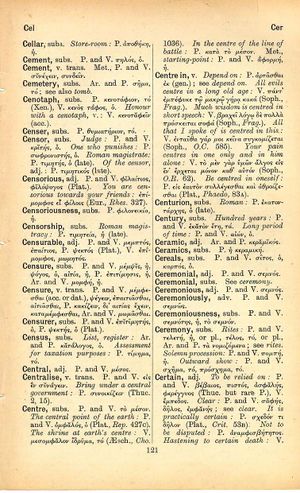censor
ὃν οὐ τύπτει λόγος οὐδὲ ῥάβδος → if words don't get through, neither a beating will | if the carrot doesn't work, the stick will not work either | whom words do not strike, neither does the rod
English > Greek (Woodhouse)
subs.
Judge: P. and V. κριτής, ὁ.
One who punishes: P. σωφρονιστής, ὁ.
Roman magistrate: P. τιμητής, ὁ (late).
Of the censor, adj.: P. τιμητικός (late).
Latin > English (Lewis & Short)
censor: ōris, m. 1. censeo; cf. also Umbr. censtur; Sanscr. canster, leader, governor,
I a censor, a Roman magistrate, of whom there were two, chosen orig. every five, and afterwards every one and a half years, who at first only had the charge of the Roman people and their property, in respect to their division according to rank or circumstances; but gradually came to the exercise of the office of censor of morals and conduct, and punished the moral or political crimes of those of higher rank by consigning them to a lower order (senatu movebant, equiti equum adimebant, civem tribu movebant, in aerarios referebant, aerarium faciebant, etc.; cf aerarius, A. b., which punishment of the censor, whether inflicted in consequence of a judicium turpe, acc. to a tribunal authorized therefor, or in accordance with the decision of the censors themselves, was called animadversio censoria or ignominia = ἀτιμία). They also, even from the most ancient times, let out the tolls, public saltworks, the building and repairing of public works, the procuring of victims for public sacrifice, etc.; cf. Cic. Leg. 3, 3, 7; Liv. 4, 8, 7; Nieb. Röm. Gesch. 2, p. 446 sq.; Dict. of Antiq., art. censor.—Also in the Roman colonies and provinces there were censors, Cic. Verr. 2, 2, 53, § 131; and id. ib. 2, 2, 56, § 138 sq.: censor, id. Clu. 14, 41; Liv. 29, 15, 10; 29, 37, 7 (in later Lat. called censitor, q. v.).—
II Trop., a rigid judge of morals, a censurer, critic: pertristis quidam patruus, censor, magister, Cic. Cael. 11, 25: castigator censorque minorum, Hor. A. P. 174: cum tabulis animum censoris sumet honesti, id. Ep. 2, 2, 110; Ov. P. 4, 12, 25: factorum dictorumque, Sen. Vit. Beat. 20, 4: servis erilis imperii non censor est, sed minister, id. Exc. Contr. 3, 9, 4: Sallustius gravissimus alienae luxuriae objurgator et censor, Macr. S. 2, 9, 9.—As fem.: ita fides prompta dura sui censor est, Ambros. Ep. 10, 83.

